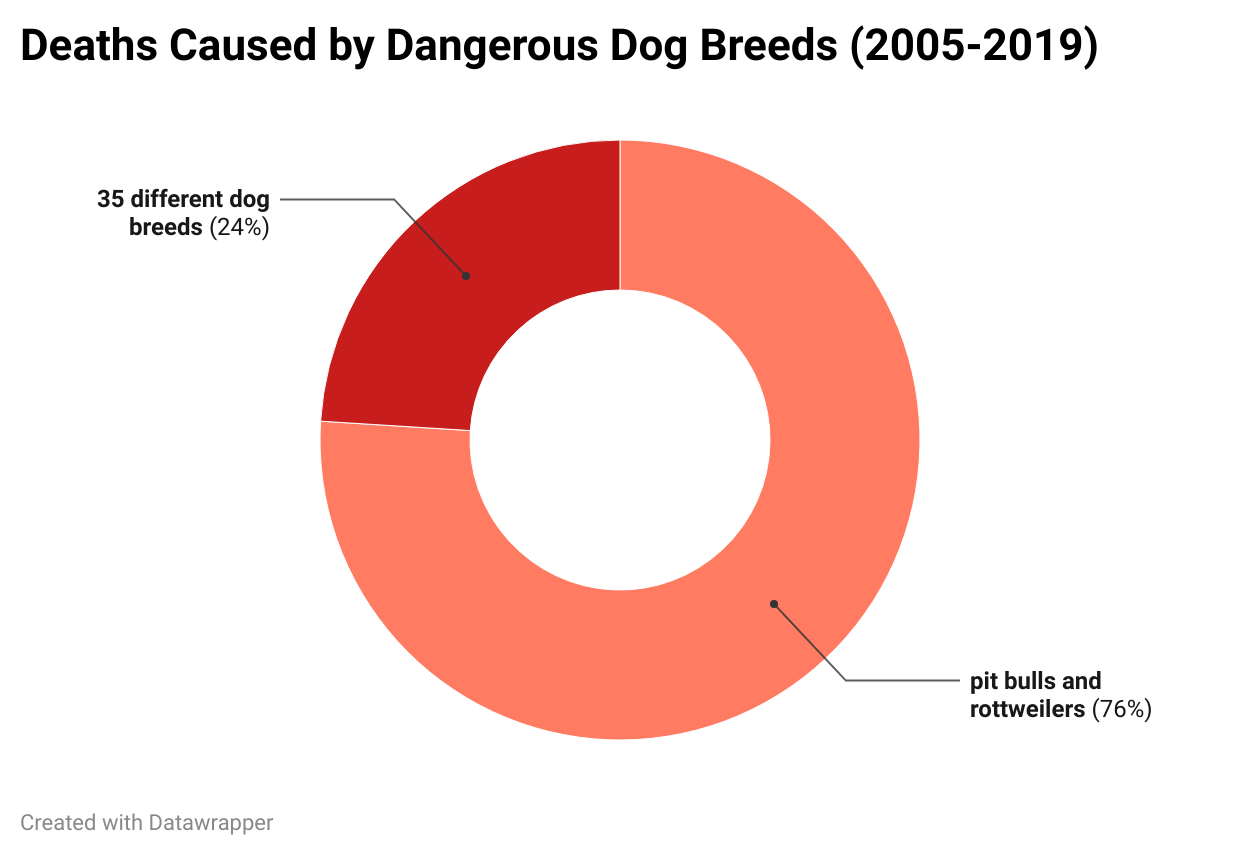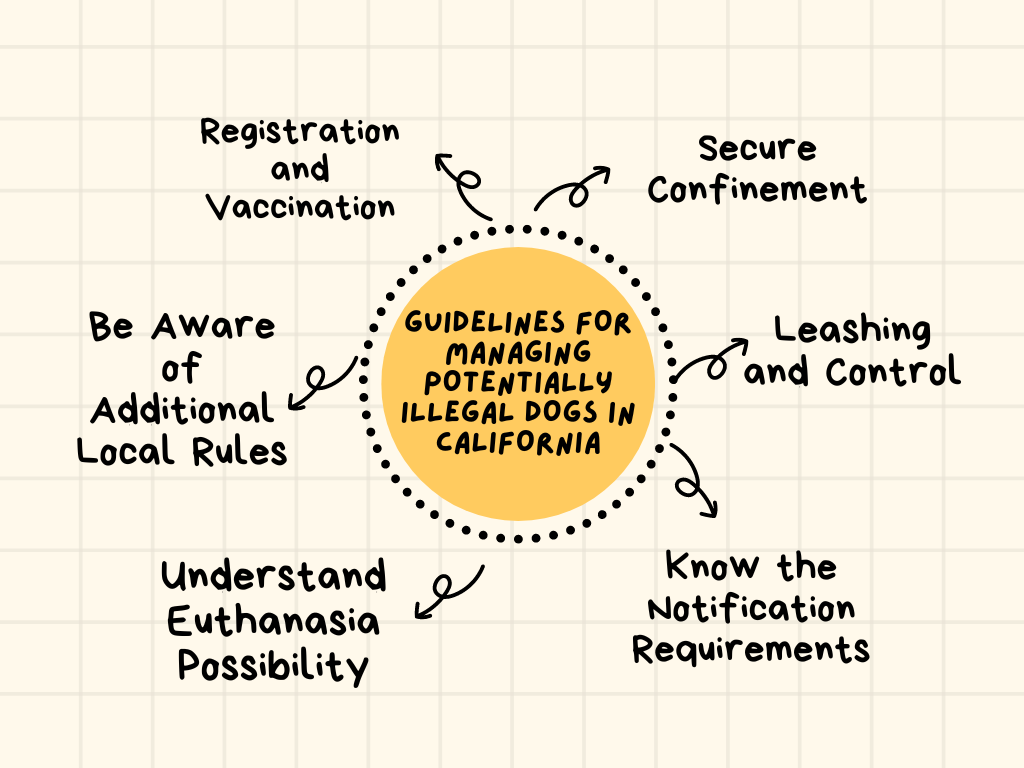It’s essential to recognize that while your dog might be the kindest creature to you, legal and financial complications can arise if your local insurance company or authorities have restrictions against certain breeds. Dog attacks pose a significant risk to both adults and children, with some breeds being more prone to aggression.
In fact, California has reported the highest number of fatal dog attacks in 2019, highlighting the severity of this issue. This concern has prompted several states and regions, including parts of California, to enforce breed-specific legislation.
This article sheds light on the legal framework surrounding illegal dogs in California. We’ll guide you through the steps to take if you find yourself dealing with such a dog and how to secure proper compensation following dog attacks.
- Breed-Specific Legislation For Illegal Dogs in California
- Difference Between Potentially Dangerous and Vicious Dogs in California
- Understanding Dog Laws in California
- Navigating Liability After an Illegal Dog Attack in California
- Guidelines for Managing Illegal Dogs in California
- What to Do If You're Bitten by an Illegal Dog in California
Breed-Specific Legislation For Illegal Dogs in California


Breed-Specific Legislation (BSL) in California addresses concerns about certain dog breeds and their potential for aggression. Despite the high profile of pit bull breeds in dog attack statistics in 2019, as reported by Dogsbite.org—California’s approach to BSL does not single out pit bulls or any other breed for disparate treatment.
The primary aim of BSL in California is to enhance public safety by encouraging responsible pet ownership. However, dog owners must understand that BSL does not equate to a ban on specific breeds. Rather, it sets guidelines to ensure that dogs, their owners, and the public can coexist safely.
Some of the key points of California’s BSL are:
- License and Spay/Neuter Requirements: California mandates that dogs identified under BSL, once they reach four months of age, must be licensed and enrolled in a spay/neuter program. This rule aims to control the population of these breeds and potentially reduce aggression levels.
- Financial Assistance: Recognizing the financial burden this might impose on some dog owners, certain California jurisdictions offer financial assistance to those facing hardships, ensuring compliance is feasible for all dog owners.
- Restricted Breeds: The legislation specifically lists several breeds under its regulations, including:
- American Staffordshire Terrier
- American Pit Bull Terrier
- Staffordshire Bull Terrier
It’s important to note, however, that owning these breeds isn’t prohibited. The law instead focuses on responsible ownership practices.
Difference Between Potentially Dangerous and Vicious Dogs in California


Understanding the legal distinctions between “potentially dangerous” and “vicious” dogs is crucial for dog owners in California. These classifications not only influence how incidents involving illegal dogs in California are handled legally but also highlight the responsibilities of pet owners to maintain public safety and prevent harm.
Potentially Dangerous Dogs
California’s legal framework outlines specific criteria for identifying potentially dangerous dogs.
These criteria include:
- Defensive Actions Required by People: If a dog, while off its owner’s property, behaves in a manner that forces someone to defend themselves to avoid injury — and this behavior occurs unprovoked at least twice within 36 months — it falls under this category.
- Minor Injuries from Bites: A dog that unprovokedly bites someone, causing less than severe injuries, is considered potentially dangerous.
- Attacks on Other Animals: Should a dog, without provocation, seriously bite, kill, or injure another domestic animal not on its owner’s property at least twice in 36 months, it’s deemed potentially dangerous. This part of the law expands the scope beyond human interactions, including harm to other animals as a factor for consideration.
Vicious Dogs
The definition of a “vicious dog” is more severe and includes:
- Severe Injury or Death: A dog that unprovokedly acts aggressively and inflicts severe injury or death on a person.
- Repeated Offenses After Declaration: A dog previously identified as potentially dangerous, which continues to display aggressive behaviors outlined under the “potentially dangerous dogs” criteria, or is kept in violation of specific sections of the code after the owner has been notified.
If you’ve been injured by a dog bite, reach out to The Personal Injury Center immediately. We’ll connect you with a skilled lawyer in California who specializes in handling dangerous dog claims. They will ensure your rights are fully protected as you seek justice.
Understanding Dog Laws in California
In California, dog ownership comes with specific legal obligations designed to protect both the public and animals from harm. Among these laws are measures specifically addressing illegal dogs in California, ensuring that owners understand the consequences of non-compliance.
Here’s a straightforward rundown of dog-related laws:
- Leash Laws: In California, it’s mandatory for dogs to be leashed at all times when in public spaces, regardless of the dog’s licensure status. This leash regulation is outlined emphasizing the importance of preventing dogs from roaming freely, a key step in reducing the risks associated with illegal dogs in California. Ignoring this law can lead to a citation, court appearance, and a fine of up to $250.
- Vaccination Requirements: Dogs aged four months and older must be vaccinated against rabies, maintaining this protection throughout their licensing period. Owners failing to vaccinate their dogs are subject to citations and potential court appearances under the law.
- Managing Dangerous Dogs: The state has put forth regulations allowing animal control agencies to label a dog as dangerous following an attack or bite incident. Owners of such dogs are required to implement preventive measures, which could include restraining or securing the dog in an enclosure, to prevent future episodes.
- Noise Control: Owners or custodians are prohibited from allowing their dogs to bark persistently, as this can be deemed a public nuisance and disturb the peace. Persistent barking may lead to a misdemeanor charge, carrying penalties of up to $1,000 or six months in jail under the California Penal Code 373(a). Neighbors disturbed by excessive barking are encouraged to file a complaint with their local Department of Animal Care and Control.
Navigating Liability After an Illegal Dog Attack in California
California enforces strict liability for dog owners, simplifying the process for victims seeking compensation after an attack. Here is a breakdown of the key aspects of liability in the aftermath of a dog attack, distinguishing between strict liability and negligence:
Strict Liability in Dog Attacks
In California, dog owners are automatically held responsible for injuries caused by their dog’s bite, regardless of the dog’s previous behavior or the owner’s knowledge of its aggressiveness.
- Key Conditions:
- The victim was bitten by the dog.
- The incident occurred in a public place or while the victim was lawfully on private property, such as performing a legal duty or visiting by invitation.
- Exceptions:
- Strict liability doesn’t cover incidents where the dog did not actually bite, such as causing a fall.
- Police or military dogs performing their duties are also exempt.
Negligence Liability in Dog-Related Injuries
When a dog’s actions cause harm without biting, such as knocking someone over or causing a traffic accident, liability is determined by negligence. The dog owner’s failure to prevent the incident through reasonable care is key.
- The burden of Proof: Victims must prove the owner’s negligence, showing a lack of reasonable effort to control or train the dog.
- Future Prevention: Owners of dogs with a history of aggression, indicated by multiple bites or severe attacks, may be ordered by courts to take preventive measures, potentially including rehoming or euthanizing the dog.
- Evidence of Negligence: Violations of local leash laws or ignoring no-dog signs strongly suggest owner negligence.
Dog bites can inflict profound physical and emotional distress. If you or a loved one is a victim, The Personal Injury Centre can connect you with a seasoned lawyer to pursue compensation for your injuries and help you through the legal process.
Guidelines for Managing Illegal Dogs in California


Owning a dog that’s been labeled potentially dangerous or vicious carries significant responsibilities under California law. Here’s a streamlined approach to ensuring safety and compliance:
- Registration and Vaccination: Owners must ensure their potentially dangerous dogs are properly registered and vaccinated. This might include paying an extra licensing fee.
- Secure Confinement: These dogs must be securely kept within the owner’s home or in a yard that’s both escape-proof for the dog and safe against entry by children.
- Leashing and Control: When off the property, the dog should be on a strong leash of a suitable length and must be controlled by an adult at all times.
- Notification Requirements: Should the dog be sold, given away, passed away, or moved, owners are required to inform animal control in writing within two days of the event or the dog’s relocation.
- Understanding Euthanasia Possibility: If a court finds a dog vicious, it may order euthanasia under the dangerous dog law. Should the dog not be euthanized, the owner will face strict measures to prevent future attacks.
- Additional Local Rules: Beyond state requirements, dog owners might encounter more specific regulations based on their locality. These can include further restrictions and measures aimed at preventing attacks but won’t be based on the dog’s breed.
What to Do If You’re Bitten by an Illegal Dog in California


If you’re bitten by a dog in California, the steps you take afterward can significantly impact your health and legal outcomes. Here’s a straightforward guide on how to respond:
Treat the Wound Immediately
If the wound is severely bleeding, call 911 right away. While waiting for emergency services, try to minimize the bleeding by applying pressure with a towel and elevating the injury to slow blood flow.
Gather Essential Information
- Witness Accounts: Collect statements and contact details from any witnesses. Their testimony could be crucial for your case.
- Dog Information: Identify the dog that bites you, if possible. Focus on obtaining its medical and vaccination history, especially regarding rabies, to assess your risk of disease.
- Owner’s Insurance: Determine whether the dog’s owner has insurance that covers dog bites. Obtain information about the dog’s health, and safety, the insurance provider, and their contact details.
Seek Legal Assistance
It’s critical to speak with a lawyer who has experience with dog bite cases. A specialized lawyer can clarify your doubts and work to secure fair compensation for you.
If you’ve suffered a dog bite, don’t hesitate to contact The Personal Injury Center. We’ll connect you with an experienced lawyer in California well-versed in the claim process, ensuring your rights are protected throughout.
Key Takeaways
|



